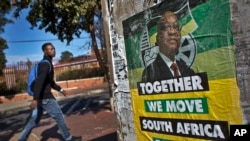JOHANNESBURG —
South Africa’s ruling African National Congress (ANC) won this year’s election, guaranteeing it another five years at the helm of Africa’s most advanced nation, but the ANC's share of the vote slipped.
In all, nearly 19 million votes were cast in last week’s national and provincial polls. With all votes counted, the ANC won just over 62 percent of the poll, compared to the opposition Democratic Alliance's 22 percent.
South African President Jacob Zuma said Saturday that his party regards the election results as a "strong sign of approval" of the work his party has done over the past 20 years.
Zuma said the victory confirmed the ANC remains the "only true hope" for most South Africans, particularly the poor and those in the working class.
"In this regard, we will use our majority to implement policies and progress that will further improve the quality of life for all, especially the poor," he said.
In an impressive achievement for a party that was launched just last year, the far-left, radical Economic Freedom Fighters nabbed third place.
The success of the party, which targeted South Africa’s large population of unemployed youth, reflects South Africa’s demographic shift toward a younger population, as does the fact that the EFF shoved aside the venerable Inkatha Freedom Party, which is led by an 85-year-old man, the respected Chief Mangosuthu Buthelezi.
Independent political analyst Ralph Mathekga says the raw numbers do not tell the whole story. He noted that although the ANC won comfortably, it has steadily lost ground since at least 2004.
“There isn’t much to celebrate," Mathekga said. "It should humble the ANC to go and do some work. And when it comes to the DA...the DA has got a lot to celebrate. They’ve grown. They’ve increased their margins in all areas. They’ve not recorded any loss of margin in any province."
Mathekga says of all the parties, the DA is the only one that has been able to gain ground with each election, while the ANC consistently sheds 3 percent.
The ANC has been dogged by criticism over its failure to provide all South Africans with basic services. To this day, some 3 million South Africans do not have electricity.
More recently, the party has been tainted by a major scandal revolving around Zuma, the party’s leader. He is accused of spending about $23 million in public funds to renovate his private home in rural KwaZulu-Natal province.
However, the ANC, by virtue of being the only party to rule South Africa since apartheid’s end in 1994, is also the party responsible for extending development to benefit the nation’s black majority, which was shut out under the former apartheid government. The party trumpeted this fact in its campaign, but Mathekga says that voters increasingly feel that is not enough.
“This type of vote that they’ve got, it’s more like a 'maintenance vote' where the voters are saying to the ANC they should go fix some of the problems, and some of the challenges that they have,” he said.
In all, nearly 19 million votes were cast in last week’s national and provincial polls. With all votes counted, the ANC won just over 62 percent of the poll, compared to the opposition Democratic Alliance's 22 percent.
South African President Jacob Zuma said Saturday that his party regards the election results as a "strong sign of approval" of the work his party has done over the past 20 years.
Zuma said the victory confirmed the ANC remains the "only true hope" for most South Africans, particularly the poor and those in the working class.
"In this regard, we will use our majority to implement policies and progress that will further improve the quality of life for all, especially the poor," he said.
In an impressive achievement for a party that was launched just last year, the far-left, radical Economic Freedom Fighters nabbed third place.
The success of the party, which targeted South Africa’s large population of unemployed youth, reflects South Africa’s demographic shift toward a younger population, as does the fact that the EFF shoved aside the venerable Inkatha Freedom Party, which is led by an 85-year-old man, the respected Chief Mangosuthu Buthelezi.
Independent political analyst Ralph Mathekga says the raw numbers do not tell the whole story. He noted that although the ANC won comfortably, it has steadily lost ground since at least 2004.
“There isn’t much to celebrate," Mathekga said. "It should humble the ANC to go and do some work. And when it comes to the DA...the DA has got a lot to celebrate. They’ve grown. They’ve increased their margins in all areas. They’ve not recorded any loss of margin in any province."
Mathekga says of all the parties, the DA is the only one that has been able to gain ground with each election, while the ANC consistently sheds 3 percent.
The ANC has been dogged by criticism over its failure to provide all South Africans with basic services. To this day, some 3 million South Africans do not have electricity.
More recently, the party has been tainted by a major scandal revolving around Zuma, the party’s leader. He is accused of spending about $23 million in public funds to renovate his private home in rural KwaZulu-Natal province.
However, the ANC, by virtue of being the only party to rule South Africa since apartheid’s end in 1994, is also the party responsible for extending development to benefit the nation’s black majority, which was shut out under the former apartheid government. The party trumpeted this fact in its campaign, but Mathekga says that voters increasingly feel that is not enough.
“This type of vote that they’ve got, it’s more like a 'maintenance vote' where the voters are saying to the ANC they should go fix some of the problems, and some of the challenges that they have,” he said.




